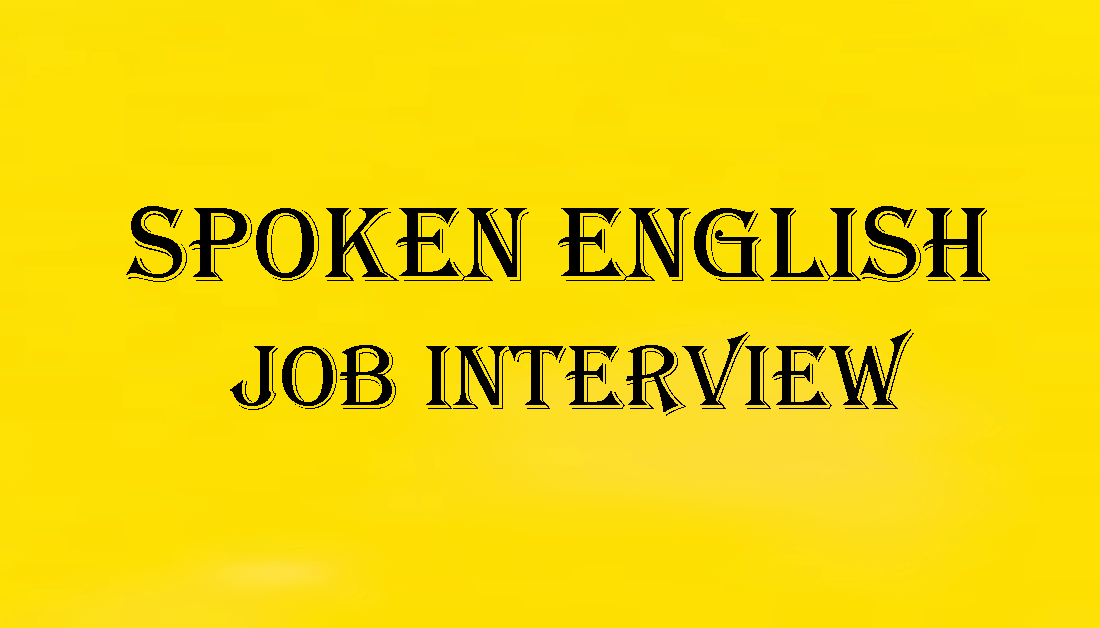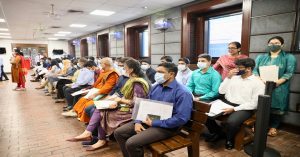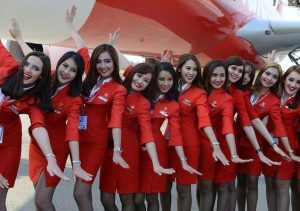- Have any questions?
- +880-1832219025
- englishrajib877@gmail.com
Spoken English-Job Interview

Describe an Interesting Competition
February 12, 2021
Describe A Present You Liked
February 14, 2021Spoken English-Job Interview

Let’s Learn How to Talk in Job Interview!
Job Seeker: May I come in, Sir?
Employer: Yes, Come in.
Job Seeker: Good morning, Sir.
Employer: Good morning. Please be seated.
Job Seeker: Thank you, Sir.
Employer: What’s your name?
Job Seeker: Hemel Barua.
Employer: Have you brought your original certificates?
Job Seeker: Yes, Sir, here’s all.
Employer: Do you know how to operate a computer?
Job Seeker: Yes sir, I have a certificate of it.
Employer: Okay, then you completed your Master’s Degree from Chittagong University.
Job Seeker: Yes, sir.
Employer: Do you have any work experience?
Job Seeker: Yes, sir. I have a long-standing experience in this line. I think you will find in me a hand expert in official correspondence.
Employer: That’s really good. Papers are all very much in your favour, I see.
Job Seeker: Yes, sir.
Employer: I think you don’t work there now.
Job Seeker: No, I don’t.
Employer: What was the name of the firm?
Job Seeker: The name of the firm was Lucent Traders.
Employer: What are you doing now?
Job Seeker: I am doing a part-time job as a correspondent in an indenting firm.
Employer: How much salary do you get now?
Job Seeker: I get 7,000 takas per month.
Employer: How much salary did you draw from Lucent Traders?
Job Seeker: I drew 20,000 takas from Lucent Traders.
Employer: Why did you resign from Lucent Traders?
Job Seeker: I resigned because I was thinking of going abroad.
Employer: Then you did not go abroad?
Job Seeker: No, I didn’t. My mother fell ill suddenly and I had to stay in Bangladesh.
Employer: Why do you want to join our company?
Job Seeker: I know yours a good company. Besides, I am confident that I can do this job well. I think I am a suitable person for this job.
Employer: Why do you think so?
Job Seeker: Because I have the necessary educational qualification and experience for this job.
Employer: How much salary do you expect?
Job Seeker: I expect at least 25,000 takas.
Employer: I think you are fit for the job.
Job Seeker: It will be so kind of you, sir.
Employer: It’s all right. I think you will do well here. So wait for the appointment letter.
Job Seeker: Many, many thanks, sir.
Job Interview between HR Manager and Candidate
HR Manager: Good morning! Thank you for coming in today. I’m [HR Manager’s Name], and I’ll be conducting the interview. Please have a seat.
Candidate: Good morning! Thank you for having me. I’m excited to be here.
HR Manager: Great to hear! Let’s start with a classic question. Can you tell me a bit about yourself and your background?
Candidate: Certainly. I hold a bachelor’s degree in [Your Field] from [Your University].
I have [X years] of experience in [relevant industry or field], where I’ve been involved in [mention key responsibilities or projects].
In my previous role at [Previous Company], I .
Overall, I’m passionate about [specific area of interest or expertise], and I’m eager to bring my skills to a new challenge.
HR Manager: That’s impressive. It sounds like you have a solid background. Can you share why you’re interested in this position and our company?
Candidate: Absolutely. I’ve been following your company for some time, and I’m particularly drawn to your commitment to [mention a specific aspect of the company, such as innovation, sustainability, or a specific project].
I believe my skills in [mention relevant skills] align well with the needs of this position, and I’m excited about the opportunity to contribute to your team and be part of [Company Name]’s success.
HR Manager: Good to know. Can you describe a challenging situation you’ve faced at work and how you handled it?
Candidate: Certainly. In my previous role at [Previous Company], we encountered a significant issue with [describe the situation].
I took the initiative to [explain your actions], and by collaborating with [team members or other departments], we were able to [mention the positive outcome].
This experience taught me the importance of effective communication and problem-solving in a team setting.
HR Manager: It’s great to hear that you can handle challenges effectively. How do you prioritize and manage your time, especially when faced with multiple tasks or tight deadlines?
Candidate: Time management is crucial, and I prioritize tasks based on their urgency and impact on overall goals.
I’m a fan of using tools like [mention specific tools or methods], and I always make sure to communicate with my team to set realistic expectations.
By breaking down larger tasks into smaller, manageable steps, I find it easier to stay organized and meet deadlines.
HR Manager: That sounds like a practical approach. Now, how do you handle constructive feedback, and can you give an example of a time when you used feedback to improve?
Candidate: I appreciate constructive feedback as it provides valuable insights for growth.
In one instance, my supervisor pointed out that I could enhance my [specific skill or behavior].
I took this feedback positively, proactively sought additional training in that area, and implemented the suggestions.
The improvement not only benefited my professional development but also positively impacted the team’s overall performance.
HR Manager: That’s a great way to handle feedback. Finally, do you have any questions for us?
Candidate: Yes, I do. Could you tell me more about the team dynamics and the company culture here at [Company Name]?
HR Manager: Absolutely. Our team is collaborative and values [mention specific values].
We encourage open communication and innovation.
As for our culture, we pride ourselves on [mention key aspects of the company culture, such as diversity, inclusivity, or any specific initiatives]. Is there anything else you would like to know?
Candidate: That provides a good overview, thank you. I’m also curious about opportunities for professional development within the company.
HR Manager: We prioritize the growth of our employees and offer various professional development opportunities, including [mention specific programs or initiatives].
We believe in investing in our team members to help them reach their full potential.
Candidate: That’s great to hear. I appreciate the information.
HR Manager: Well, thank you for taking the time to interview with us today. We will be in touch soon regarding the next steps in the hiring process.
Candidate: Thank you! I look forward to the possibility of working with the team at [Company Name].
HR Manager: Have a great day!
Candidate: You too!
Basic English Speaking-Daily Activities
Joe Lara: Are all the days monotonous in your life? published
Naomi Osaka: No, they are not. Usually, the weekdays follow some routine.
On those days I give attention to my business and professional work.
I like to work hard. Still, I can take a break as necessary.
Joe Lara: What would you like to change in your daily routine?
Naomi Osaka: In fact, I am a responsible woman and can make necessary changes in my daily routine whenever I need.
Sometimes after working hard for a few days I don’t feel like working anymore and want to take more rest and disagree with my daily work schedule.
Then I spend one or two days in relative rest, getting up from bed late, spending more time with my family, watching TV for a long time, and doing only very emergency professional work.
Joe Lara: Tell me about your typical weekdays and typical weekends.
Naomi Osaka: On a typical weekday I get up early in the morning, have breakfast at home with my family, go to my office, and get engrossed in my professional work.
Usually, I take my lunch at nearby restaurants and sometimes go home for lunch. Generally, I work late.
Sometimes I have to visit distant places in connection with my work. Then I have to follow a special work schedule.
At weekends I do not follow any routine. Usually, I get up late and start my day in a relaxed mood.
I play with my sons and chat with my siblings. I watch TV and go out in the afternoons to visit some friends and relatives.
Joe Lara: What is the balance of work and rest in a normal day?
Naomi Osaka: Usually I try to work as much as possible. Normally I work 6-7 hours very seriously during the whole day.
Basic English Speaking-Social Status & Advertising
Jason Kokrak: What things show status in your country?
Naomi Osaka: A beautiful house or apartment in the posh areas of the city, a car, a laptop computer, a big garden or orchard, ownership in big companies or business firms, etc. show status in our country.
Jason Kokrak: Do you think it was different for your grandparents?
Naomi Osaka: Yes, I do. Things were a little bit different for my grandparents. At that time things like a big mansion, a large area of cultivable land, a horse cart, a huge number of cattle, etc. were things of status.
Jason Kokrak: Modern society is often called materialistic. What would you say about that?
Naomi Osaka: As far as I am concerned, in modern societies, people have become much busy and practical.
There is hard competition in almost every field of work and employment.
Even students have to be very serious about academic success. Moreover, the necessities of a person have increased manifold.
For meeting those necessities, one has to earn a lot of money and consequently work harder and harder.
With such rigorous competition and work schedule, one gets very little time for social and philanthropic activities.
Furthermore, people have become much self-centered due to the breakdown of traditional joint families.
All these things have played their respective roles in making modern society materialistic.
Jason Kokrak: Do you think consumerism is a positive or negative development?
Naomi Osaka: I think consumerism is a positive development though it has some negative impacts.
Jason Kokrak: What is the role of advertising in modern societies?
Naomi Osaka: The role of advertising is both positive and negative. Advertising lets people know about a certain product and help them make their purchase decision.
Without advertisements, people will not be able to know about a product, buy the product, and subsequently, the producer will not produce the product.
So, advertising is essential for the development of any kind of industry.
On the other hand, we can see that attractive advertisements allure us to buy many things we do not need.
Such purchases are certainly a waste of money and resource.
Jason Kokrak: How do you think the internet will affect buying patterns in the future?
Naomi Osaka: There is a big potential for internet or e-commerce in future business activities.
Transaction on the internet has already become a reality. I think the practice will grow eventually with the increase of internet users in the country.
But I think it will need more time for e-commerce to be popular in Bangladesh as the rate of internet users in this country is not high yet.





